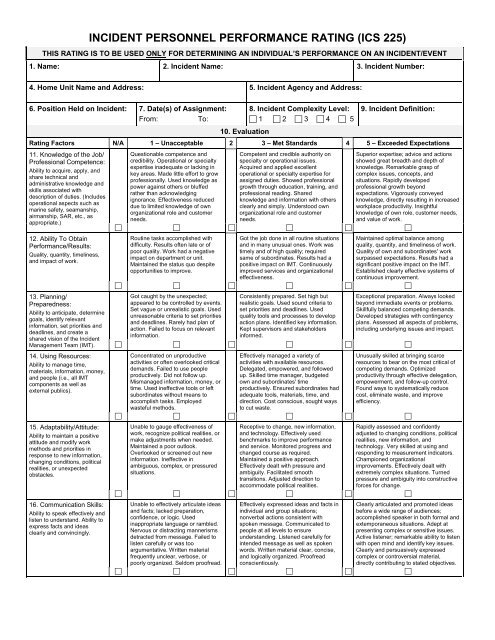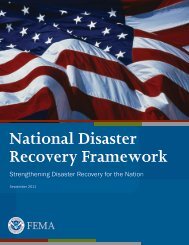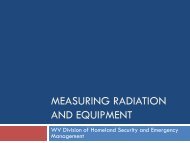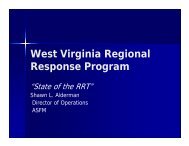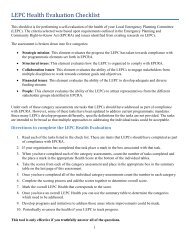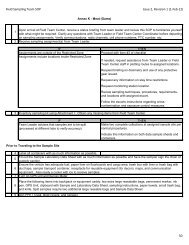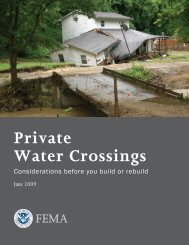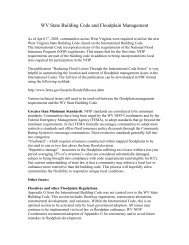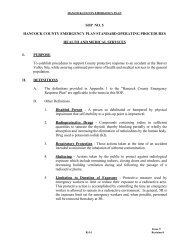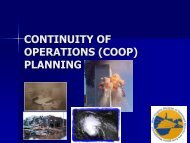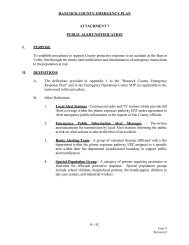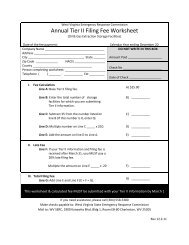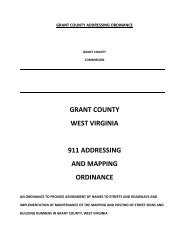ICS Forms - West Virginia Division of Homeland Security
ICS Forms - West Virginia Division of Homeland Security
ICS Forms - West Virginia Division of Homeland Security
- No tags were found...
You also want an ePaper? Increase the reach of your titles
YUMPU automatically turns print PDFs into web optimized ePapers that Google loves.
INCIDENT PERSONNEL PERFORMANCE RATING (<strong>ICS</strong> 225)THIS RATING IS TO BE USED ONLY FOR DETERMINING AN INDIVIDUAL’S PERFORMANCE ON AN INCIDENT/EVENT1. Name: 2. Incident Name: 3. Incident Number:4. Home Unit Name and Address: 5. Incident Agency and Address:6. Position Held on Incident: 7. Date(s) <strong>of</strong> Assignment:From:To:10. Evaluation8. Incident Complexity Level: 1 2 3 4 59. Incident Definition:Rating Factors N/A 1 – Unacceptable 2 3 – Met Standards 4 5 – Exceeded Expectations11. Knowledge <strong>of</strong> the Job/Pr<strong>of</strong>essional Competence:Ability to acquire, apply, andshare technical andadministrative knowledge andskills associated withdescription <strong>of</strong> duties. (Includesoperational aspects such asmarine safety, seamanship,airmanship, SAR, etc., asappropriate.)12. Ability To ObtainPerformance/Results:Quality, quantity, timeliness,and impact <strong>of</strong> work.13. Planning/Preparedness:Ability to anticipate, determinegoals, identify relevantinformation, set priorities anddeadlines, and create ashared vision <strong>of</strong> the IncidentManagement Team (IMT).14. Using Resources:Ability to manage time,materials, information, money,and people (i.e., all IMTcomponents as well asexternal publics).15. Adaptability/Attitude:Ability to maintain a positiveattitude and modify workmethods and priorities inresponse to new information,changing conditions, politicalrealities, or unexpectedobstacles.16. Communication Skills:Ability to speak effectively andlisten to understand. Ability toexpress facts and ideasclearly and convincingly.Questionable competence andcredibility. Operational or specialtyexpertise inadequate or lacking inkey areas. Made little effort to growpr<strong>of</strong>essionally. Used knowledge aspower against others or bluffedrather than acknowledgingignorance. Effectiveness reduceddue to limited knowledge <strong>of</strong> ownorganizational role and customerneeds.Competent and credible authority onspecialty or operational issues.Acquired and applied excellentoperational or specialty expertise forassigned duties. Showed pr<strong>of</strong>essionalgrowth through education, training, andpr<strong>of</strong>essional reading. Sharedknowledge and information with othersclearly and simply. Understood ownorganizational role and customerneeds.Superior expertise; advice and actionsshowed great breadth and depth <strong>of</strong>knowledge. Remarkable grasp <strong>of</strong>complex issues, concepts, andsituations. Rapidly developedpr<strong>of</strong>essional growth beyondexpectations. Vigorously conveyedknowledge, directly resulting in increasedworkplace productivity. Insightfulknowledge <strong>of</strong> own role, customer needs,and value <strong>of</strong> work. Routine tasks accomplished withdifficulty. Results <strong>of</strong>ten late or <strong>of</strong>poor quality. Work had a negativeimpact on department or unit.Maintained the status quo despiteopportunities to improve.Got the job done in all routine situationsand in many unusual ones. Work wastimely and <strong>of</strong> high quality; requiredsame <strong>of</strong> subordinates. Results had apositive impact on IMT. Continuouslyimproved services and organizationaleffectiveness.Maintained optimal balance amongquality, quantity, and timeliness <strong>of</strong> work.Quality <strong>of</strong> own and subordinates' worksurpassed expectations. Results had asignificant positive impact on the IMT.Established clearly effective systems <strong>of</strong>continuous improvement. Got caught by the unexpected;appeared to be controlled by events.Set vague or unrealistic goals. Usedunreasonable criteria to set prioritiesand deadlines. Rarely had plan <strong>of</strong>action. Failed to focus on relevantinformation.Consistently prepared. Set high butrealistic goals. Used sound criteria toset priorities and deadlines. Usedquality tools and processes to developaction plans. Identified key information.Kept supervisors and stakeholdersinformed.Exceptional preparation. Always lookedbeyond immediate events or problems.Skillfully balanced competing demands.Developed strategies with contingencyplans. Assessed all aspects <strong>of</strong> problems,including underlying issues and impact. Concentrated on unproductiveactivities or <strong>of</strong>ten overlooked criticaldemands. Failed to use peopleproductively. Did not follow up.Mismanaged information, money, ortime. Used ineffective tools or leftsubordinates without means toaccomplish tasks. EmployedEffectively managed a variety <strong>of</strong>activities with available resources.Delegated, empowered, and followedup. Skilled time manager, budgetedown and subordinates' timeproductively. Ensured subordinates hadadequate tools, materials, time, anddirection. Cost conscious, sought waysUnusually skilled at bringing scarceresources to bear on the most critical <strong>of</strong>competing demands. Optimizedproductivity through effective delegation,empowerment, and follow-up control.Found ways to systematically reducecost, eliminate waste, and improveefficiency.wasteful methods.to cut waste. Unable to gauge effectiveness <strong>of</strong>work, recognize political realities, ormake adjustments when needed.Maintained a poor outlook.Overlooked or screened out newinformation. Ineffective inambiguous, complex, or pressuredsituations.Receptive to change, new information,and technology. Effectively usedbenchmarks to improve performanceand service. Monitored progress andchanged course as required.Maintained a positive approach.Effectively dealt with pressure andambiguity. Facilitated smoothtransitions. Adjusted direction toaccommodate political realities.Rapidly assessed and confidentlyadjusted to changing conditions, politicalrealities, new information, andtechnology. Very skilled at using andresponding to measurement indicators.Championed organizationalimprovements. Effectively dealt withextremely complex situations. Turnedpressure and ambiguity into constructiveforces for change. Unable to effectively articulate ideasand facts; lacked preparation,confidence, or logic. Usedinappropriate language or rambled.Nervous or distracting mannerismsdetracted from message. Failed tolisten carefully or was tooargumentative. Written materialfrequently unclear, verbose, orpoorly organized. Seldom pro<strong>of</strong>read.Effectively expressed ideas and facts inindividual and group situations;nonverbal actions consistent withspoken message. Communicated topeople at all levels to ensureunderstanding. Listened carefully forintended message as well as spokenwords. Written material clear, concise,and logically organized. Pro<strong>of</strong>readconscientiously.Clearly articulated and promoted ideasbefore a wide range <strong>of</strong> audiences;accomplished speaker in both formal andextemporaneous situations. Adept atpresenting complex or sensitive issues.Active listener; remarkable ability to listenwith open mind and identify key issues.Clearly and persuasively expressedcomplex or controversial material,directly contributing to stated objectives.


